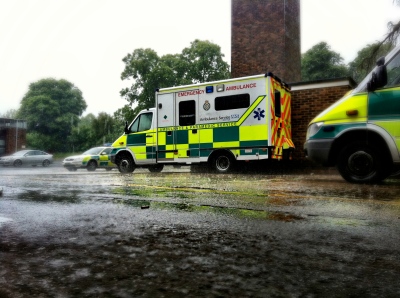This is a post written by @FatManonaBike on his blog 'Fat Man on a Bike'. I felt it wonderfully sums up the struggle and reality that the NHS is facing and well worth sharing with one and all! Enjoy!
"The Thin Green Line"
There are few things in life about which I can speak (or write) with any kind of authority, and cycling certainly isn’t one of them. Neither, for that matter is politics, nor the subject of this post: the current failings of the National Health Service.
To be fair, that’s a little bit unfair. The NHS is not failing. Given the kicking the NHS receives on a almost daily basis by the men in suits that control the money, it’s an absolute miracle that the UK has a health service at all. Despite terrible funding cuts (or, no less difficult to manage, insufficient funding increases), inappropriate decisions made by people that have little idea what planet they’re on, and the ridiculous notion that healthcare is a profit-making scheme, the NHS still makes sick people well, and does so with dignity, professionalism and compassion. I work for the NHS. I’m one of those chaps in green outfits, as seen on Casualty. No…not Jimmy the Porter…more like Josh Griffiths, but good-looking and with hair. I’m frequently told, “Oh, I couldn’t do your job”, which clearly means I’m made of tougher stuff than some of you. This, in turn, means that I could duff you up in a fight and, therefore, unless you wish to find your nose bloodied you should stop what you’re doing and pay attention. This is your NHS, and like the punch-drunk boxer struggling to stay standing, it’ll only be a matter of time before a suited politician comes along to put it out of its misery.
Earlier in this post, I told a lie. It was unintentional, but a lie nevertheless. This isn’t about the failings of the NHS per se, but a small part of it. In fact, that’s probably a little inaccurate, too. This post is about inadequacies, not failings, yet such inadequacy will invariably lead to failure for the unfortunate minority. Sadly, such failure doesn’t mean that a business folds, a shop closes, or someone has to go back to working on the bins. Without being even slightly melodramatic, it means people die. Actual proper death. Gone. Brown bread. It could be you, your mum or dad, your wife or husband, brother, sister, girlfriend, boyfriend, etc. I think you probably get the picture without me listing all possible relationship statuses. Dead. To your terrible sorrow is now added bucketsful of anger. You watch, helpless to save your loved one dying, still waiting for the ambulance three hours after you called.
Ambulance delays are now an everyday occurrence. Fact. Lengthy delays. Life-threatening delays.
There are always occasions when delays are inevitable. Ambulance services are not immune to bad weather, heavy traffic, or the overwhelming desire of the general public to get pissed, then have a fight on New Year’s Eve. Heavy snow can turn a six-mile journey into a three-hour affair, but this isn’t the shit I’m talking about. I’m talking about your average day. A Tuesday, perhaps, because nothing of note ever happens on Tuesday. On every single average day, many lengthy delays can and do occur.

By now, an Ambulance Service manager, hot under the collar and fuming at my words, may be preparing to lynch me. That’s fine, but I suggest that he or she reads on first. I have a point to make before I swing. The point is that such terrible delays are not our fault. On paper, provision of ambulance cover is just about adequate. In practice, it would be equally be just about adequate were it not for closing Accident and Emergency departments, false or shelved promises of new super-hospitals, reductions in hospital beds, forced redundancies of hospital staff, and a whole host of other problems created purely by penny-pinching, blinkered civil servants, keen to make a saving that ultimately ensures their job security in the next reshuffle. The city in which I work does not have an A&E department, and hasn’t had one for over ten years. In the last two years, the towns on either side have also lost their A&E departments. The super-hospital that was promised prior to closing those A&E departments is invisible or, more probably, unbuilt. So where do ambulance patients go now? Very simply, they go to an Accident & Emergency department. An Accident & Emergency department that can not, for very obviously-logical reasons, cope with the additional influx of the sick, dying and dead. An Accident and Emergency department in a hospital that has had the number of beds, nurses and doctors reduced. An Accident & Emergency department that has ambulances queuing for hours outside it’s doors. The ambulance simply pushes the first domino, and they just keep on falling.
If you’re expecting me to have the answers to all these problems, you’ll be disappointed. Clearly, running the NHS as if it were a business, rather than as a publicly-funded healthcare-providing service, doesn’t work. Beyond massive cash injections, restoration (or an increase) of the pre-existing healthcare provision, u-turns in political policy, careful and considered spending, and people having the balls to admit that not all the implemented changes work, I fail to see how or when the NHS can pull itself away from the ropes and come out fighting.